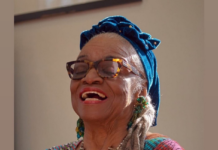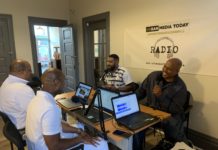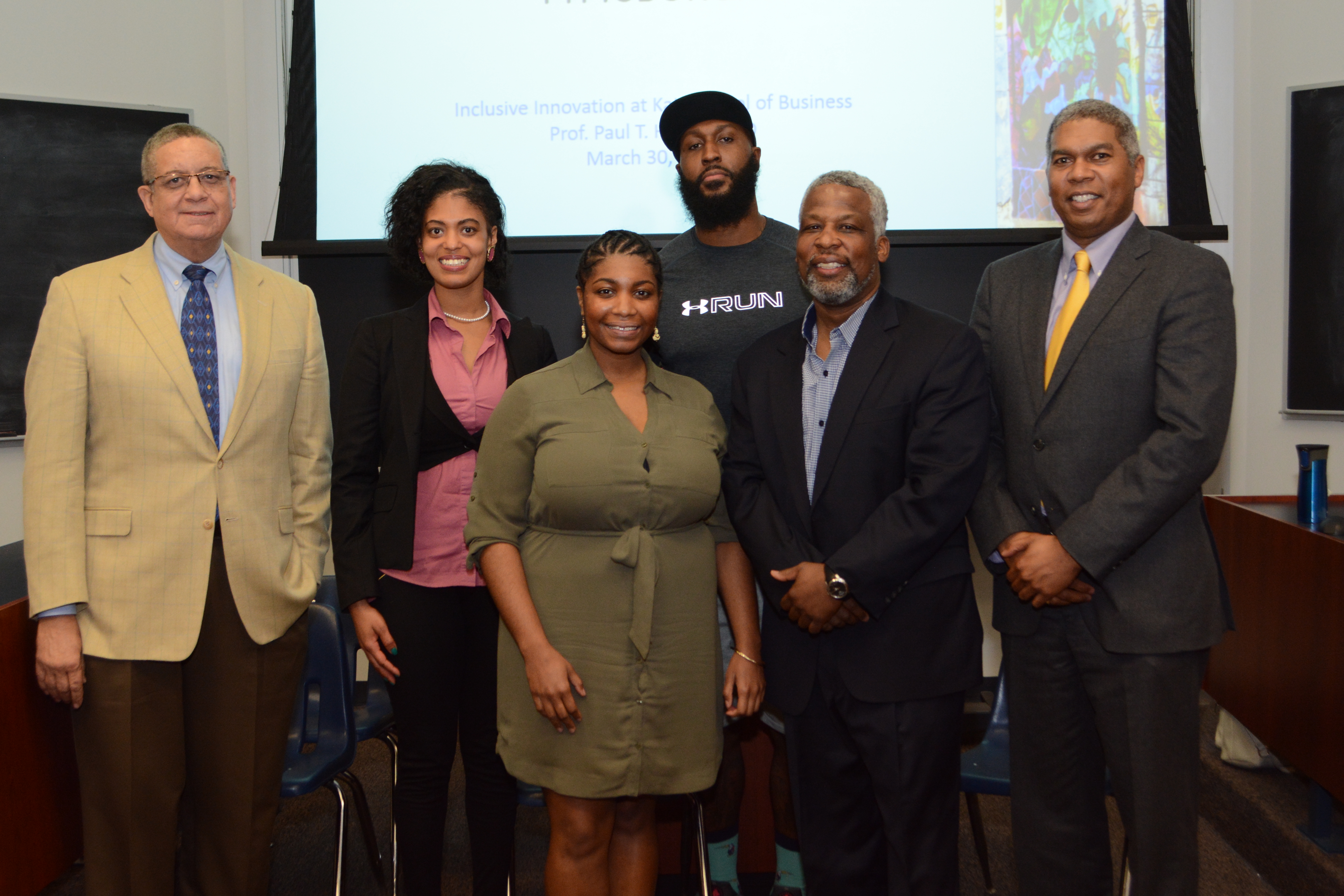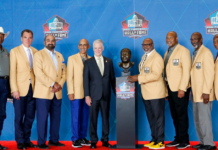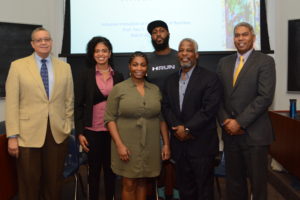
THE ENTREPRENEURS(L-R): Gregory Spencer, moderator LaTriece Holland, Courtney Williamson, Ronald Scott, Paul Harper, Ph.D.
by C. Denise Johnson
In today’s business ecosystem, the wide array of entrepreneurial opportunities seems endless. Those who choose an ownership track must meet those aspirations with insight, determination, vision and purpose.
Pittsburgh is no different with an increasing number of emerging small businesses.
Black entrepreneurs must deal with additional layers of bureaucratic red-tape in place to “level the playing field” to circumnavigate the vestiges of institutional racism.
For his MBA level course in Inclusive Innovation, Paul Harper, Ph.D. assembled panels to present the realities of Pittsburgh’s business climate the experiences for black entrepreneurs and black stakeholders for his students in the University of Pittsburgh’s Katz School of Business.
As a caregiver for a family member, Courtney Williamson recognized a need for support care and created the first orthotic device for Parkinson’s Disease patients to improve posture and balance – the Calibrace+ (Williams’s engineering background was instrumental in developing the biomedical product). It is available through her company call AbiliLife.
As a former professional athlete Chris Edmonds blended his passion and skill set in establishing a fitness enterprise, Athletic Trauma Unit (#ATU) in 2014. “The mission of #ATU is to promote physical activity for people of all ages, with the idea that a body in motion stays in motion for a lifetime,” he said. #ATU has a mission to remove the financial barrier to health and fitness and offers all services and classes free to attendees. In Feb. 2015, #ATU established itself as a designated 501c3 organization, aligning with the strategic goals of the organization to provide a healthy lifestyle, living and being at no cost to participants.
Ron Scott is from a family tradition of entrepreneurs and realized he “couldn’t meet my potential in corporate America,” he established RS Supplies, LLC, thus creating an opportunity for him to reach unlimited opportunities on his own terms. He made immediate use of one of his resources – his family, friends and church. “You grow by taking part to learn and network, and stepping outside of your comfort zone,” said Scott, who joined the African American Chamber of Commerce of Western Pennsylvania, the Eastern Minority Supplier Development Council and his fraternal affiliates.
Greg Spencer made a similar transition after retiring from Equitable Resources as Senior Vice President and Chief Administrative Officer in 2006. He took a different track to entrepreneurship by purchasing an existing specialty chemical company, Randall Enterprises, finding that being an entrepreneur was quite a change from the corporate world. Initially most entrepreneurs don’t have staff, he said. “They do everything from A to Z.” Spencer also had a learning curve to contend with which helped him to benefit from mistakes (“failure makes me work harder”).
After boning up on the manufacturing and distribution aspects of specialty chemicals, and using resources (through the Pennsylvania’s foreign trade office). Spencer looked beyond the region and tapped into international markets to reach customers in Taiwan, Korea, China and Malaysia.
If you want to grow, you must take advantage of what and who you know. On average it takes 11 years for a small business to break the $1 million ceiling, said Scott. Align yourself with others who share your passion.
Entrepreneurs grow by adding people and being able to bring folks on that you trust. “Your business is your baby,” said Scott, “don’t reinvent wheel, it’s not necessary. Use resources as you create wealth for yourself and family, and leave a legacy.”
Have a team of well-equipped players said, Spencer as others nodded in agreement. “Invest in other people so you can work smarter, not necessarily harder,” added Edmondson; he started with his fraternity brothers.
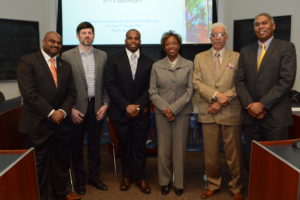
In terms of a leaving a legacy or secession plan, besides hoping family members will carry on, all agreed on wanting to inspire those they’ve mentored and leave something of value to the community.
“Dream big but start when you’re comfortable. Build your brand, believe in yourself,” said Edmondson.
Scott started his business in his home; his first customers were his church, and a day care. “You build confidence along with business. Inspire those coming behind, bring them with you.”
Williamson uses her competence and passion while continuing to support and develop a network to improve the quality of life and research for Parkinson’s patients.
Network creation is crucial because relationships are important and they take time to build. “You can’t be afraid to let down your guard to develop a relationship,” added Scott.
The flip side of the entrepreneurial coin was represented by Stakeholders Panel, comprised of Clarence Curry of CFC Management Services, a former Katz faculty member and Senior Diversity Consultant to the Sports and Exposition Authority; Doris Carson Williams, president of the African American Chamber of Commerce of Western Pennsylvania; Ricardo Williams, Manager of Equity and Inclusion in the Office of Pittsburgh Mayor Peduto; and Will Bernstein, Senior Policy Analyst of the Allegheny Conference of Community Development.
These stakeholders are essentially advocates of regional black owned businesses. The Chamber’s goal is to improve opportunities and build relationships with its 60 corporate members, while the Allegheny Conference is a think tank that covers a ten county region of the 300 largest employers; one of its initiatives, Vibrant Pittsburgh, encourage members to invest in a diverse culture in recruitment and retention of minority talent. Williams added that the region lost Black corporate executives as large corporations left Pittsburgh during the collapse of the steel industry.
There are challenges to contend with in Pittsburgh as minority business enterprises (MBEs). MBE certifications is not an instant guarantee and certification does not obligate corporations to be to be part of the growth, and MBEs is hampered by limited access to capital. To break the traditional barriers, institutions such as CMU, UPMC, Pitt need to commit and be deliberate in purchasing from MBE/DBE.
Curry mentioned strategies as such as a project labor agreement for trade unions be put into play with the coming estimated 168 infrastructure projects over the next 25 years.
The conundrum, Carson-Williams pointed out, was a problem of equity in labor unions. Set-aside programs are a thing of the past, replaced with goals i.e. the Housing Authority of the City of Pittsburgh made an objective to 45% participation of MBE/WBE on housing authority projects.
Bernstein said the businesses not inclusive in leadership are the biggest challenge as Carson-Williams emphasized that the common goal is to discuss race, the perception and how to identify a comfort zone for proceed forward to inclusion and partnership.



